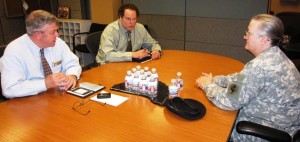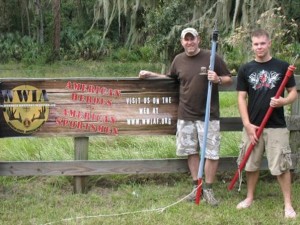
SSG Cynthia Lyons of the 423rd Transportation Company meets with Dennis McCormack (left) and Joe Fowler. Fowler replaced McCormack as Lyons' Army Wounded Warrior representative, and this was Fowler's first chance to get to talk with Lyons and understand her situation.
By Stacie Shain
Fort Carson Warrior Transition Battalion Public Affairs Officer
When Joe Fowler met Advocate Dennis McCormack over two years ago as he entered the Army Wounded Warrior (AW2) program, he never dreamed he would someday take over his job. But when McCormack decided to retire in November, he knew Fowler was the perfect replacement.
“When I decided I was going to retire, and I knew Joe wanted to go to work, I thought he’d be perfect for the job,” Dennis said.
For Fowler, it’s a chance to give back to a program that has helped him recover and move on with his life. He gave up Social Security and disability benefits to accept the job.
“I think I bring a different perspective to the job,” Fowler said. “I can show other AW2 Soldiers that there is an end to it all. And I want to help out and do anything I can to give back.”
Said McCormack: “Joe is an inspiration to many Soldiers. His attitude is great. He shows how someone can serve, get injured, and then come back.”
Coming back hasn’t been easy for Fowler, however. He’s already had 19 surgeries and faces a few more to recover from injuries he received in Iraq four years ago while working as a dog handler with the 759th Military Police Battalion, 148th MP detachment and attached to the 10th Mountain Division.
On December 11, 2005, Fowler and his Belgian Tervuren, Dak, were being dropped off for a three-day mission to search trucks near Baghdad. Elections were upcoming, and tensions were high. Just four minutes outside Camp Victory, the Humvee Fowler was riding in rolled over an improvised explosive device (IED), and the anti-tank mine caused the Humvee to explode.
“I was ejected from the Humvee,” said Fowler. “I was still on fire, and I saw flames on my body. First thing I did was try to calm down. The ‘stop, drop, and roll’ doesn’t really work when you are wearing body armor with ammo pouches, so I had to take off my vest, and then roll.”
Injured Soldiers were everywhere. The gunner and the driver landed to the right of the explosion in a culvert. The gunner broke his pelvis, had a fractured left foot that later had to be amputated, and traumatic brain injury. The driver also fractured his pelvis and had minor burns on his hands.
The truck commander was thrown 300 feet and died instantly.
Once he’d put out the flames, Fowler immediately searched for Dak, only to find that his dog had been killed in the blast.
Within minutes, a combat medic arrived to start treating the injured, and Fowler was loaded in a truck and taken to the troop medical clinic at Camp Victory. From there, he was loaded into a Black Hawk and placed in a medical-induced coma. Fowler doesn’t remember the trip back to the U.S., arriving at Brooke Army Medical Center (BAMC) in San Antonio, Texas, on December 14, 2005.
BAMC became Fowler’s new home, as he spent almost two years there getting treatment for his burns, a broken right ankle, a broken right wrist and a dislocated right elbow. While the burns were mostly on his right side, 54 percent of them were second- and third-degree burns.
Although he grew up in Oceanside, California, Fowler wanted to return to Colorado Springs when he was released from the hospital.
“I had spent 10 years on active duty, and I had a lot of friends still here in the area, so I wanted to come back here,” he said.
Following his release from BAMC, Fowler took a year off to enjoy time with his wife, Leslie, and son, Shane, who was born during his deployment.
“I took that time off to really do nothing,” he said. “I wanted to go fishing, mountain biking, and hiking.”
Fowler was also named a Sentinel in the Sentinels of Freedom program. The program provides what its Web site (www.sentinelsoffreedom.org) calls “life scholarships,” which help severely wounded veterans become self sufficient.
The program allowed Fowler to return to school, helped Leslie Fowler get a teaching job in Colorado, and refurbished his home. Fowler is still involved in the program, helping coordinate outreach events for the organization and attending events.
“I’m the pretty face,” he said.
But now Fowler is more than a Sentinel. He’s an AW2 Advocate to 44 Soldiers who are in the program.
“The best I can do is to talk to these Soldiers and tell them there’s an end to what they are going through,” Fowler said. “I can help them get to their end goal and do whatever makes them happy.”
Fowler is spending his first two months meeting every AW2 Soldier under his advocacy, talking with them, getting a feel for their needs, and letting them get to know him and what he’s been through in his recovery.
Along with AW2 Advocate Ed Butler, Fowler is primarily concentrating on Soldiers at Fort Carson who are not in the Warrior Transition Battalion.
While Fowler steps into his position, McCormack plans to travel with his wife, spend more time with his grandchildren, work with local non-profit organizations, such as Homefront Cares, and try to make more connections between Fort Carson and the local community.
“I’ll stay busy with projects, working to help veterans and wounded warriors,” McCormack said. “And I’ll keep in touch and work with Joe to keep supporting Soldiers.”
While he was feeling guilty about leaving the AW2 program, McCormack knows he leaves it in capable hands.
“Joe will do just fine,” he said. “Knowing Joe is my replacement makes me feel better about retiring.”
The Army Wounded Warrior program is “the official U.S. Army program that assists and advocates for severely wounded, ill, and injured Soldiers, Veterans, and their Families, wherever they are located, for as long as it takes,” according to its Web site (www.aw2.army.mil). AW2 provides personalized support to the most severely injured or ill Soldiers who suffered injuries or illnesses during Overseas Contingency Operations since Sept. 11, 2001. Such support includes services in career and education, finance, health care, human resources, insurance, and family services.
As of August 2009, there are more than 5,000 Soldiers in the AW2 program and approximately 160 Advocates worldwide. Dennis said the number of AW2 Soldiers has doubled in the past 30 months.
There are seven AW2 Advocates in Colorado Springs, including six at Fort Carson (four who work with the Warrior Transition Battalion, plus Fowler and Butler who work with the 4th Infantry Division) and another in Colorado Springs who works with the veteran population in town.







